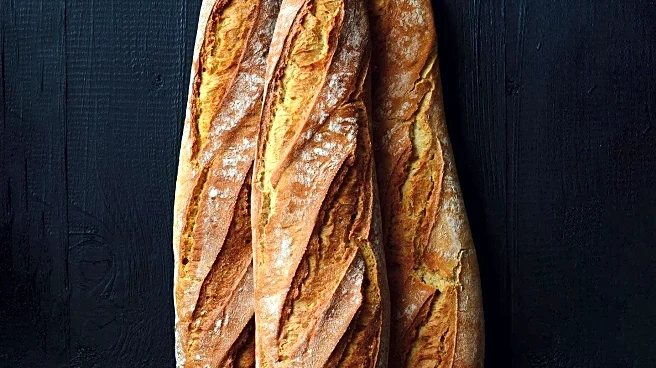What's Happening?
French bakeries are experiencing a shift in bread consumption patterns, with traditional baguettes facing a decline in popularity. Despite the baguette's UNESCO heritage status, bread consumption in France has decreased significantly, with younger generations
opting for fast food and processed sliced white bread. Artisan bakers like Benoît Castel are leading a movement towards 'neoboulangeries,' focusing on sourdough and whole grain loaves, which are perceived as healthier and more sustainable. This trend is reshaping the bread industry, as some bakeries choose not to sell baguettes, challenging traditional expectations.
Why It's Important?
The decline in baguette consumption reflects broader changes in dietary habits and cultural preferences in France. This shift impacts the traditional bakery industry, prompting bakers to innovate and adapt to new consumer demands. The rise of 'neoboulangeries' highlights a growing interest in health-conscious and environmentally sustainable food options. As younger generations move away from daily baguette purchases, the industry faces challenges in maintaining cultural heritage while meeting modern needs. This evolution could influence global perceptions of French cuisine and affect international markets that value traditional French bread.
What's Next?
Bakeries may continue to diversify their offerings, focusing on specialty breads that cater to health-conscious consumers. The industry might see increased collaboration between traditional and modern bakers to preserve cultural heritage while embracing innovation. As consumer preferences evolve, bakeries could explore new marketing strategies to attract younger demographics. Additionally, there may be discussions on how to balance affordability with quality, ensuring that artisanal breads remain accessible to a wider audience. The ongoing adaptation of French bakeries could serve as a model for other countries facing similar shifts in food consumption.
Beyond the Headlines
The transformation in French bread consumption raises questions about cultural identity and the preservation of culinary traditions. As bakeries innovate, they must navigate the tension between maintaining heritage and embracing modernity. This shift also highlights the importance of sustainable practices in food production, as bakers prioritize organic ingredients and reduce food waste. The evolution of the bread industry may influence broader discussions on food security and environmental impact, encouraging other sectors to adopt similar practices. The cultural significance of bread in France underscores the need for thoughtful adaptation in preserving national identity.
















